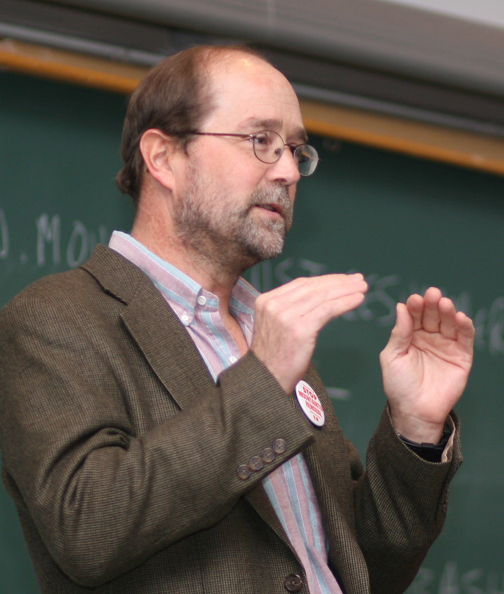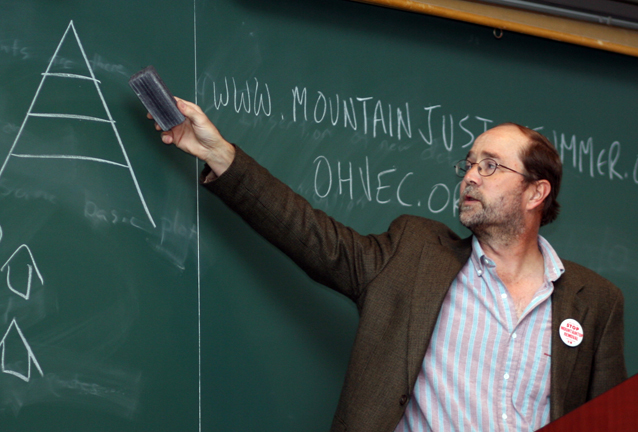 The next time you turn on the lights or your computer, think of the tops of mountains being blown off in West Virginia. The Wabash students and faculty who attended Dave Cooper’s talk on mountaintop removal mining certainly will.
The next time you turn on the lights or your computer, think of the tops of mountains being blown off in West Virginia. The Wabash students and faculty who attended Dave Cooper’s talk on mountaintop removal mining certainly will.
Cooper was a mechanical engineer with a good job when he first heard Larry Gibson’s speech about mountaintop removal mining and the many ways it was devastating West Virginia’s natural heritage.
"Larry described the destruction of the land around his family home on Kayford Mountain, and I figured nothing could really be that bad," Cooper told Wabash students and faculty Wednesday. "So I went to see for myself, and it was actually much worse." (See a video of Larry Gibson and Kayford Mountain.)
"Southwest West Virginia is getting hammered by mountaintop removal," Cooper said, describing how he left his job to become an activist to end this form of mining, which he said has buried more than 1,000 miles of streams and removed more than 250 mountains in West Virginia in the past 20 years.
"Fifty-one percent of the electricity in the United States is produced by coal," Cooper said, adding that Indiana’s neighbor, Kentucky gets 95% of its electricity from coal-burning plants. "Every time you flip on a light switch, you're connected to the problem."
Cooper said that mountaintop removal mining is "destroying some of the world’s most productive hardwood forests and clean drinking water." He diagrammed how the tops of mountains are blasted away and the "overburden" (which he said was the coal companies’ word for the tops of mountains) dumped into "valley fills", some of which are miles wide. These fills cause flooding and can pollute drinking water.
 "We’re destroying supplies of drinking water at a time when cities like Atlanta are experiencing water shortages," Cooper said.
"We’re destroying supplies of drinking water at a time when cities like Atlanta are experiencing water shortages," Cooper said.
"Four million pounds of explosives are used everyday in mountaintop removal," the activist added. "Most people don’t think about it, but we waste a lot of electricity, and that’s part of the problem. The end result is we are sabotaging massive parts of Appalachia."
Mountaintop removal mining is much less labor-intensive than the shaft mining it replaced, so the companies employ only a fraction of the people they once did in the rural areas of the state.
"These are very poor areas with few jobs—most are in the school system or mining, and there have been few attempts to diversify," Cooper said. "But by changing over to mountaintop removal mining and using so few employees, the coal industry is probably putting more people out of work than the environmentalists."
Cooper also noted that while mountaintop removal mining is destroying the West Virginia’s natural heritage and degrading communities, much of that land—75% percent—is owned by companies and individuals outside of the state.
"A lot of the true costs of electricity are not on your electric bill," Cooper said. "It shows up in the costs of insurance, in taxes, in the loss of drinking water."
Cooper’s talk was sponsored by the College’s Students for Sustainability, whose president, Nathan Rutz, spent two months last summer with Coal River Mountain Watch, a group attempting to raise awareness of mountaintop removal and protect the people and environment where such mining takes place. Rutz wrote about his experience in "Mountain Justice" in Wabash Magazine.
Read more about Rutz’ experiences here.
http://www2.wabash.edu/blog/pa/2007/08/post_9.html
Read more about mountaintop removal mining in "Coal Mining Ravages Appalachia."
http://www.thestar.com/sciencetech/Environment/article/306165